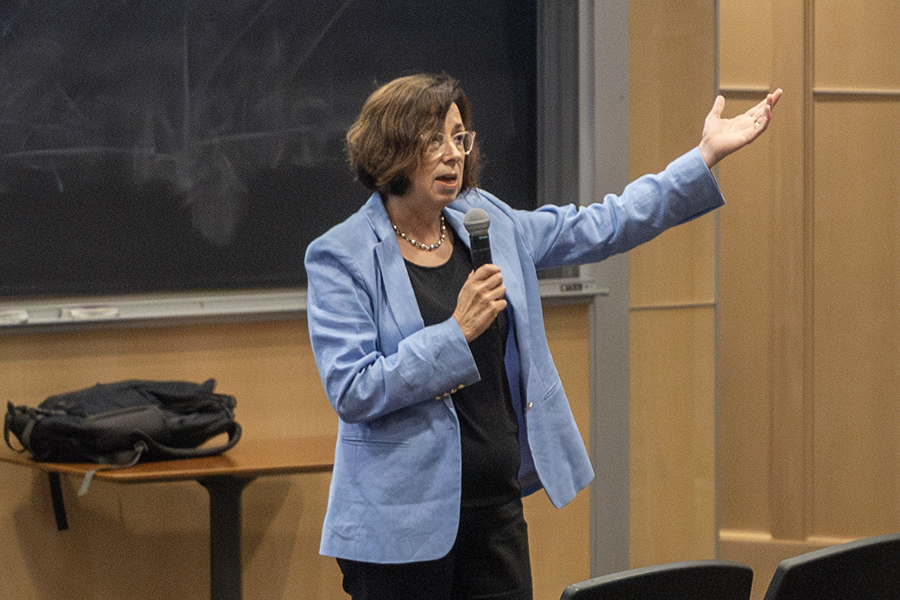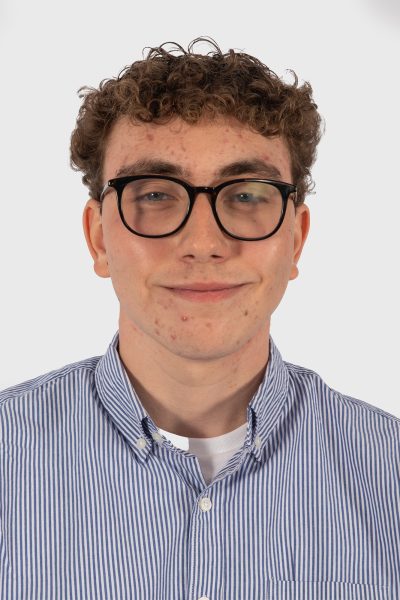In honor of Constitution Day, Suzanne Mettler, John L. Senior professor of American institutions at Cornell University, came to Ithaca College on Sept. 18 to speak to students about the U.S. Constitution and democracy in today’s polarized political climate.
Mettler was invited to the college by Michael Trotti, professor in the Department of History and legal studies coordinator. The talk focused on the democratic and undemocratic features of the Constitution, the limitations the Constitution faces and the effects of the rural-urban divide on American politics.
Mettler started the presentation by sharing a quote from former President Barack Obama’s 2020 Democratic National Convention speech, when he said despite its flaws, the Constitution is a North Star that guides the country to become better. She asked the audience to reflect on what the Constitution means to them.
“Do you think of the Constitution having embedded in it this idea of democracy that allows us to even make the country more just and more equal over time?” Mettler said. “Or, as some folks have told me in recent years, should we really just burn it all down?”
Mettler said the Constitution has novel democratic elements, like the rejection of nobility and the separation of church, and state in the Bill of Rights. She said the Constitution establishes a republic where people can vote for their leaders and when their leaders have to face reelection.
“This is all of us as citizens saying we are forging this agreement together,” Mettler said. “We are forming a government, and it’s going to be a government where authority comes from the people themselves, not from a king, not from a tyrant, not from some small group of wealthy oligarchs or some particular religious group, but rather, all of us — ‘we the people.’”
Mettler said the Constitution has undemocratic features, like the appointing of senators until 1913, the 3/5 compromise and the sanctioning of slavery. She said the Electoral College and the Senate can leave some voters with more power than other voters depending on where they live.
“The state of California has 66 times as many inhabitants as the state of Wyoming,” Mettler said. “In other words, the people in Wyoming have a lot more political power in the U.S. Senate, as a result, and there’s a lot of political science research that shows this. If you look at fiscal policy of budgets, the senators that represent those small population states are able to bring home more bacon, so to speak.”
First-year student Nolan Swinwood, a politics major, echoed this sentiment when talking about how democracy plays a role in the Constitution.
“I do think it’s interesting how our Constitution was written to support a federal republic,” Swinwood said. “It does harbor democracy and does go against democracy at the same time, particularly in the way the Electoral College and the United States Senate is set.”
Mettler said one major limitation of the Constitution is the amendment process. She said there have only been 17 amendments to the Constitution since 1791, and the 18th and 21st amendment cancel each other out, emphasizing how — despite the Constitution being flawed — it is difficult to change.
Mettler emphasized in her presentation how drastic the rural-urban divide has become in politics. She said that starting around 1996, rural voters became more supportive of Republican candidates while urban voters have consolidated their support for Democratic candidates. She said part of this divide can be attributed to the economic fallout in the 2000’s, which widened the economic gap between rural and urban communities.
“What is distinctive today is that all of those levers in the Constitution that give extra power to people in less populated places are consolidated in one political party, and that hasn’t happened before,” Mettler said.
Senior Khayla Robinson shared her thoughts about the rise in political polarization in American politics.
“I’m sure it has always been pretty polarized, but it just feels like now it’s been a little bit more heavy,” Robinson said. “It can be a lot to witness and make informed decisions about this world.”
Mettler ended her talk by telling the audience that the way to make progress in society is through democratic means.
“You have to work hard to bridge connections with people who are differently situated than yourself,” Mettler said. “If you’re an urban person, to work together with people who live in rural places, to work together across all sorts of differences in society, to build big coalitions … is the way that real, meaningful change and reform can happen.”















